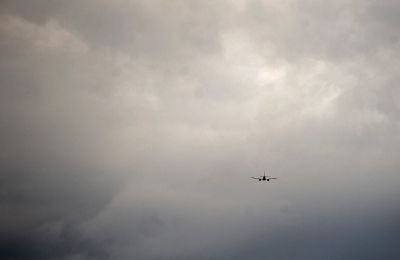New clouds of volcanic ash from Iceland's Eyjafjoell volcano brought fresh misery for tens of thousands of air travellers on Monday as key European airports were forced to close.
In the Netherlands, some 500 flights into and out of Amsterdam-Schiphol were cancelled after it was shut for seven hours until re-opening at 1100 GMT.
London Heathrow, Europe's busiest air hub, and London Gatwick, were also hit by a new round of delays and cancellations following a six-hour overnight shutdown.
British Airways, Dutch carrier KLM and Irish budget airline Ryanair - frustrated after weeks of disruption - criticised the latest flight restrictions, saying authorities had over-reacted.
Around 1,000 flights in Europe were cancelled Monday, said Eurocontrol, the intergovernmental agency coordinating air traffic control.
Heathrow, and Gatwick, Britain's second-busiest airport, resumed flights at 0600 GMT, but more than 120 departing flights and 115 arrivals had to be cancelled.
British airspace was later declared clear of the volcanic ash until at least 0000 GMT on Tuesday.
But many passengers at smaller British airports were left disappointed.
At Liverpool in northwest England, Margaret Palombella, 55, found her flight to Portugal was still cancelled even after the flight ban for the airport was lifted.
"It's been terrible. There's just nothing going," she said. "They said I might be able to get away on Wednesday night."
British Airways chief executive Willie Walsh blasted the blanket bans on flying, saying they were "a gross over-reaction to a very minor risk".
His criticism was echoed by KLM after the disruption to Dutch airspace.
"The closure was unnecessary. The flight control service should have first measured the concentration of ash and then took a decision," said KLM spokeswoman Joyce Veekman.
Irish airline Ryanair attacked the computer-generated projections used by safety authorities to work out the no-fly zones, saying they were insufficiently detailed.
Chief executive Michael O'Leary said: "It is frankly ridiculous that the flight plans of millions of air passengers across Europe are being disrupted on a daily basis by an outdated, inappropriate and imaginary computer-generated model and it is time that these charts were done away with."
The seven-hour closure of Schiphol left 60,000 passengers stranded around the world. Airports in Rotterdam and Groningen also reopened after closing temporarily.
In Ireland, Dublin airport reopened at midday (1100 GMT) after a 17-hour shutdown as the cloud moved east. Almost 300 flights were cancelled, disrupting 36,000 passengers, The Irish Times newspaper said.
In Britain, new measures to minimise the disruption to flights caused by volcanic ash will be introduced Tuesday.
The Civil Aviation Authority said a Time Limited Zone (TLZ) had been agreed, in which it will be safe to allow flights for a limited time at higher ash densities than are currently permitted.
To operate in the new zone, airlines need to present the authority with a safety case that includes the agreement of their aircraft and engine manufacturers - budget airline Flybe was the first to achieve this.
There was more good news for air travellers when British Airways succeeded in a legal bid to block a series of four five-day strikes by cabin crew that had been due to start on Tuesday.
The latest restrictions follow a week-long partial closure of Europe's skies last month following the eruption of Eyjafjoell. That was the biggest shutdown of the continent's airspace for more than 50 years.
The international airline industry body, IATA, has estimated last month's shutdown cost carriers some 1.7 billion dollars (1.4 billion euros).
In Iceland, there was no sign of the volcano stopping.
The Eyjafjoell eruptions, which began on April 14, have peaked three times, with the latest surge of activity coming Friday.
"There is really no way of telling when it will stop... magma is still emerging," Icelandic geophysicist Magnus Tumi Gudmundsson said.
High concentrations of volcanic dust can damage plane engines.
Subscribe to Independent Premium to bookmark this article
Want to bookmark your favourite articles and stories to read or reference later? Start your Independent Premium subscription today.


Join our commenting forum
Join thought-provoking conversations, follow other Independent readers and see their replies